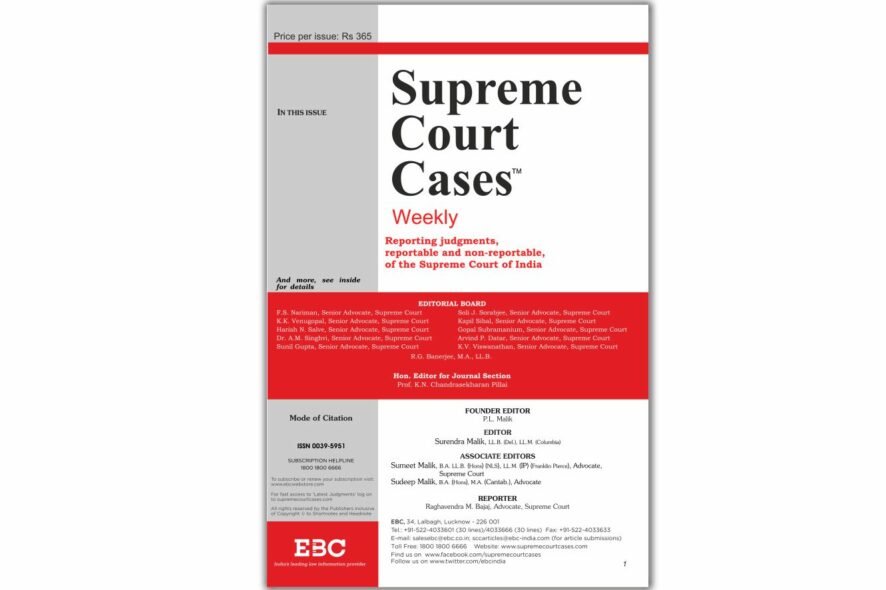In Part 4 of 2022 SCC Volume 3, read some very pertinent Supreme Court decisions, involving aspects regarding reservation, accountability of social media platforms, service law and more.
Constitution of India — Arts. 14, 15, 16 and 226 — Writ of mandamus in matters of reservation — Scope and limit: Order of High Court directing State Government to increase the percentage of reservation for a particular category, that is, to provide for 3% reservation/quota for sportspersons, instead of 1% provided by State Government, held, beyond its jurisdiction and a grave error. Court cannot issue a mandamus: (i) to provide for reservation or reservation for any particular community even on basis of any quantifiable data brought to its notice, or (ii) to collect quantifiable data to justify their action of not providing reservation. [State of Punjab v. Anshika Goyal, (2022) 3 SCC 633]
Constitution of India — Arts. 19(1)(a) & (2) and Arts. 194 & 105 — Accountability of Social media platforms, for posts made on such platforms by third parties: Extent of accountability of Social media platforms for posts made by third parties to House Committee of State Legislature, determined. [Facebook v. Delhi Legislative Assembly, (2022) 3 SCC 529]
Criminal Law — Public Accountability, Vigilance and Prevention of Corruption — Constitutional Authorities/Functionaries/High Public Offices — Security of Prime Minister of India: Directions issued for judicial inquiry into breach and lapses as the convoy of PM was stuck on a flyover for around 20 minutes. Records relating to PM’s visit seized and secured. Directions also issued for constitution of Enquiry Committee, terms of reference and stay of ongoing proceedings by Central and State Governments. [Lawyers Voice v. State of Punjab, (2022) 3 SCC 521]
Criminal Procedure Code, 1973 — S. 389: Suspension of sentence by Supreme Court on ground of plea of juvenility taken before Supreme Court for the first time, when warranted, explained. [Sagar Behara v. State of W.B., (2022) 3 SCC 526]
Criminal Procedure Code, 1973 — S. 439 — Bail: Grant of bail without considering relevant aspects and recording reasons is not justified. Law summarised regarding principles for grant of bail and considerations to be balanced therefore. [Manoj Kumar Khokhar v. State of Rajasthan, (2022) 3 SCC 501]
Criminal Procedure Code, 1973 — S. 482 — Failure to exercise quashment power — When not proper: In this case of alleged misappropriation of monies of complainant and others, main allegations are against other co-accused, in the facts and circumstances of the case, it was held that to continue criminal proceedings against both appellant-accused herein would be abuse of process of law and court and unnecessary harassment to appellants. Hence, High Court ought to have exercised its powers and discretion under S. 482 CrPC and ought to have quashed criminal proceedings against appellants. Hence, criminal proceedings under Ss. 406, 420, 467, 468, 471 and 120-B IPC including charge-sheet, quashed and set aside insofar as appellants herein are concerned. [Rekha Jain v. State of U.P., (2022) 3 SCC 497]
Service Law — Pension — Computation/Calculation of pension: In this case, respondent retired after one month of rejoining from leave for about two years without allowances. Cl. 2(2) as modified vide Circular GO (P) No. 230/2012/Fin. dt. 19-4-2012 envisaged that for computing 10 months’ emoluments for purpose of average emoluments in respect of employee who retired from service on or after 1-1-2006 and who during part 10 months drew pay in pre-revised scale, their pay in pre-revised scale was to be enhanced notionally to initial pay drawn in revised scale. For calculating average emoluments as per Kerala Services Rules, if during period of ten months, employee was absent from duty, on leave with or without allowances which qualified for pension, or having been suspended was reinstated in service without forfeiture of service, his emoluments for ascertaining average were to be taken, at what they would have been, had he not been absent from duty or suspended provided that benefit of pay in any officiating post would be admissible only if it was certified that he would have continued to hold that officiating post but for leave or suspension. Thus, part of 10 months not equivalent to past 10 months. Hence, impugned judgment finding fixation of pension @ Rs 19,334 in revised scale justified considering last drawn pay of Rs 46,400 by respondent, calls for no interference. [State of Kerala v. Anie Lukose, (2022) 3 SCC 629]







